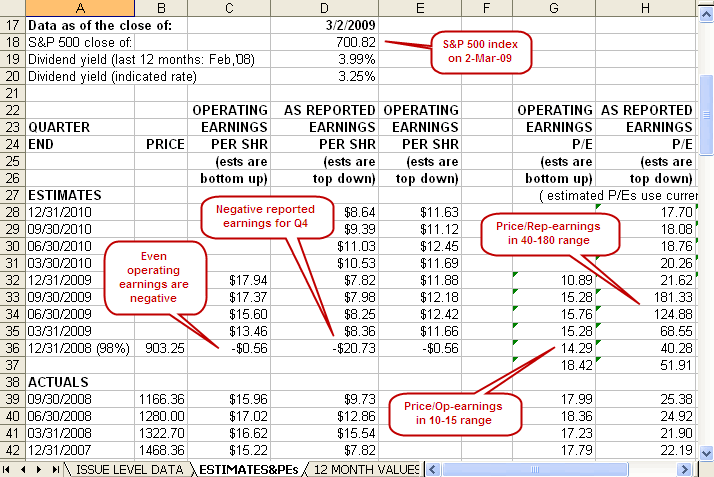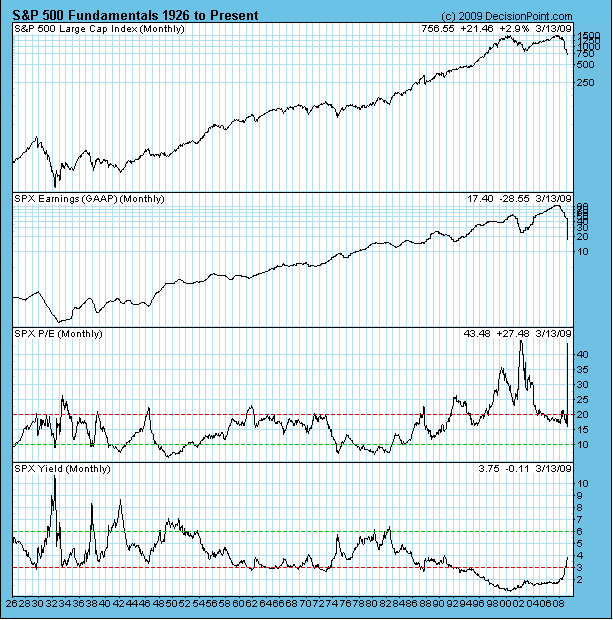
Dynamics

|
Generational Dynamics |
| Forecasting America's Destiny ... and the World's | |
| HOME WEB LOG COUNTRY WIKI COMMENT FORUM DOWNLOADS ABOUT | |
Wrong so many times, what do they make of last week's stock market rally?
Last week on Bloomberg TV (or was it CNBC?) I heard a discussion of the latest corporate earnings reports for Q4 of 2008. The analyst said, "Those figures can't be right. That would mean that the S&P index should be around 300." (That's roughly equivalent to a Dow Industrials index of 3000.)
Welcome to the new world of financial journalism and analysis. The folks at CNBC and Bloomberg TV and the Wall Street Journal and other financial media have been using fudged figures for years to justify the bloated stock market bubble, and now they completely believe their own lies.
There's a feeling of total chaos in these media outlets these days, because no one knows what to say about the price/earnings ratios (also called "valuations"), as Q4 earnings have turned negative.
I've complained many times on this web site about the out and out lies of analysts, advisors and journalists. Even today, you still hear about "valuations being at historic lows," which is total crap.
These analysts, who make 6 and 7 digit salaries by collecting fat commissions from their clients, use a variety of techniques to lie about valuations.
The most common is to use "forward earnings" to compute the P/E ratio. That means you divide the stock price by the bloated estimates for earnings in the following year. By making earnings as high as possible, the P/E ratio becomes lower.
But something has happened in the last few weeks. After several quarters where actual earnings turned out to be far lower than earlier estimates, investors don't automatically believe the bloated "forward earnings" estimates any more.
As we wrote last month, fourth quarter reported earnings are crashing. The actual reported earnings are far below the analyst estimates of only a few weeks earlier. This means that people who use "forward earnings" to compute P/E ratios now have to face the reality that "forward earnings" estimates are crashing along with reported earnings.
The same is happening with another form of dishonesty - the use of "operating earnings." Once again, the objective is to bloat the earnings estimates up as much as possible, so that the P/E ratio is as low as possible.
"Operating earnings" came into fashion during the dot-com bubble of the late 1990s. Analysts and brokers and financial advisers needed a way to justify recommendations to buy stock during the dot-com bubble, even though valuations were extremely high. And so they invented a form of earnings that doesn't count "one-time expenses" and whatever else they felt they could get away with excluding. This boosted the earnings figures, and lowered the P/E ratios.
But now analysts are confounded again, because even "operating earnings are crashing, along with reported earnings.
Since I posted my article last month on the crash in reported earnings, several web site readers have written to me, asking where they could get price/earnings ratio figures. This question has been heavily discussed in the Financial Topics thread of the Generational Dynamics forum, where a number of suggestions have been posted.
Here are several places that regularly provide price/earnings ratios:
Let's take a look at the last item, because it contains some shocking news. If you download the spreadsheet and load it into your spreadsheet program, you'll see the following:
 |
The data shown on this spreadsheet is as of 2-March-2009. The S&P500 index on that day was 700.82. Please note the following points, indicated by the balloons in the above graphic:
Your eyes are not deceiving you. The earnings crash that we've been discussing indicates an astronomical P/E later this year, assuming that the S&P index remains at 700.
The Decision Point Earnings Summary that I described above is updated every week. Here are their summaries in their 13-March-2009 report:
|----------------------------------------------------------| | | Price/Earnings Ratios based on | | Quarter | Reported Earnings |Operating Earnings| |-------------------|-------------------|------------------| |Q4 2008 | 43.5 | 15.4 | |Q1 2009 (Estimated)| 74.0 | 16.5 | |Q2 2009 (Estimated)| 134.9 | 17.0 | |Q3 2009 (Estimated)| 296.0 | 16.5 | |Q4 2009 (Estimated)| 23.3 | 11.8 | |----------------------------------------------------------|
Here is the graphic accompanying Friday's report showing historical data from 1926 to the present:
 |
Notice the sharp spike in P/E ratios in the third graph, thanks to the crash in reported corporate earnings.
In practical terms, what all this means is the following: The S&P 500 index is going to have to fall much further, to the 300 range or lower. This means that the Dow Industrials index will fall to the 3000 range or lower.
That's why journalists and analysts are freaking out. They're looking desperately at any way to avoid talking about those figures. Instead, they point to last week's market rally, and say, "Let's hope and pray that it continues."
I guess a P/E ratio of 181 isn't good enough for them. Perhaps they'd prefer to see it go up to 1000.
(To understand why it can't continue, see "The outlook for 2009" and "How to compute the 'real value' of the stock market.")
The Obama administration is evidently feeling exactly the same kind of desperation. On Sunday morning on Meet the Press, Dr. Christina Romer, head of Obama's Council of Economic Advisers, was asked "What is the responsible thing for consumers to do at the height of this global crisis?" Here's her response:
 |
Regular readers of this web site, who understand my sense of humor, will not be surprised to know that I couldn't stop laughing when I heard this moronically stupid statement. But this is what passes for common sense among the politicians, analysts, journalists, winners of the Nobel Prize in Economics, and others in Washington.
Several web site readers have asked me recently whether last week's modest Wall Street rally means that things have turned around -- or will the market fall again below the levels of two weeks ago?
You won't get a straight answer to this question from any of the financial blogs or from the mainstream financial media, and certainly not from the politicians. They'll all hem and haw, and argue about "U-shaped" and "L-shaped" recessions, and make sanctimonious statements blaming everyone but themselves for not seeing what was coming.
So let me make this as clear as possible to readers of this web site: If you've been staying in the market because you continue to believe the crap that you continue to hear from the financial media and the Obama administration, and from ideologues like Paul Krugman (on the left) at the New York Times, and Larry Kudlow (on the right) at CNBC, then you're going to face further financial disaster.
The economy has been in a sharp deflationary spiral for over a year. The market WILL fall well below Dow 3000 with near 100% certainty. and almost certainly will fall sharply from current levels within the next few months, and will not recover for many years. (Paragraph corrected - 16-Mar)
(Comments: For reader comments, questions and discussion, as
well as more frequent updates on this subject, see the Financial Topics thread of the Generational Dynamics forum. Read
the entire thread for discussions on how to protect your money.)
(15-Mar-2009)
Permanent Link
Receive daily World View columns by e-mail
Donate to Generational Dynamics via PayPal
Web Log Summary - 2016
Web Log Summary - 2015
Web Log Summary - 2014
Web Log Summary - 2013
Web Log Summary - 2012
Web Log Summary - 2011
Web Log Summary - 2010
Web Log Summary - 2009
Web Log Summary - 2008
Web Log Summary - 2007
Web Log Summary - 2006
Web Log Summary - 2005
Web Log Summary - 2004
Web Log - December, 2016
Web Log - November, 2016
Web Log - October, 2016
Web Log - September, 2016
Web Log - August, 2016
Web Log - July, 2016
Web Log - June, 2016
Web Log - May, 2016
Web Log - April, 2016
Web Log - March, 2016
Web Log - February, 2016
Web Log - January, 2016
Web Log - December, 2015
Web Log - November, 2015
Web Log - October, 2015
Web Log - September, 2015
Web Log - August, 2015
Web Log - July, 2015
Web Log - June, 2015
Web Log - May, 2015
Web Log - April, 2015
Web Log - March, 2015
Web Log - February, 2015
Web Log - January, 2015
Web Log - December, 2014
Web Log - November, 2014
Web Log - October, 2014
Web Log - September, 2014
Web Log - August, 2014
Web Log - July, 2014
Web Log - June, 2014
Web Log - May, 2014
Web Log - April, 2014
Web Log - March, 2014
Web Log - February, 2014
Web Log - January, 2014
Web Log - December, 2013
Web Log - November, 2013
Web Log - October, 2013
Web Log - September, 2013
Web Log - August, 2013
Web Log - July, 2013
Web Log - June, 2013
Web Log - May, 2013
Web Log - April, 2013
Web Log - March, 2013
Web Log - February, 2013
Web Log - January, 2013
Web Log - December, 2012
Web Log - November, 2012
Web Log - October, 2012
Web Log - September, 2012
Web Log - August, 2012
Web Log - July, 2012
Web Log - June, 2012
Web Log - May, 2012
Web Log - April, 2012
Web Log - March, 2012
Web Log - February, 2012
Web Log - January, 2012
Web Log - December, 2011
Web Log - November, 2011
Web Log - October, 2011
Web Log - September, 2011
Web Log - August, 2011
Web Log - July, 2011
Web Log - June, 2011
Web Log - May, 2011
Web Log - April, 2011
Web Log - March, 2011
Web Log - February, 2011
Web Log - January, 2011
Web Log - December, 2010
Web Log - November, 2010
Web Log - October, 2010
Web Log - September, 2010
Web Log - August, 2010
Web Log - July, 2010
Web Log - June, 2010
Web Log - May, 2010
Web Log - April, 2010
Web Log - March, 2010
Web Log - February, 2010
Web Log - January, 2010
Web Log - December, 2009
Web Log - November, 2009
Web Log - October, 2009
Web Log - September, 2009
Web Log - August, 2009
Web Log - July, 2009
Web Log - June, 2009
Web Log - May, 2009
Web Log - April, 2009
Web Log - March, 2009
Web Log - February, 2009
Web Log - January, 2009
Web Log - December, 2008
Web Log - November, 2008
Web Log - October, 2008
Web Log - September, 2008
Web Log - August, 2008
Web Log - July, 2008
Web Log - June, 2008
Web Log - May, 2008
Web Log - April, 2008
Web Log - March, 2008
Web Log - February, 2008
Web Log - January, 2008
Web Log - December, 2007
Web Log - November, 2007
Web Log - October, 2007
Web Log - September, 2007
Web Log - August, 2007
Web Log - July, 2007
Web Log - June, 2007
Web Log - May, 2007
Web Log - April, 2007
Web Log - March, 2007
Web Log - February, 2007
Web Log - January, 2007
Web Log - December, 2006
Web Log - November, 2006
Web Log - October, 2006
Web Log - September, 2006
Web Log - August, 2006
Web Log - July, 2006
Web Log - June, 2006
Web Log - May, 2006
Web Log - April, 2006
Web Log - March, 2006
Web Log - February, 2006
Web Log - January, 2006
Web Log - December, 2005
Web Log - November, 2005
Web Log - October, 2005
Web Log - September, 2005
Web Log - August, 2005
Web Log - July, 2005
Web Log - June, 2005
Web Log - May, 2005
Web Log - April, 2005
Web Log - March, 2005
Web Log - February, 2005
Web Log - January, 2005
Web Log - December, 2004
Web Log - November, 2004
Web Log - October, 2004
Web Log - September, 2004
Web Log - August, 2004
Web Log - July, 2004
Web Log - June, 2004